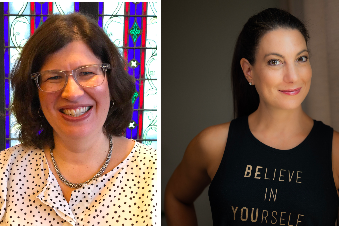By: Katja Rowell, MD and Anna Lutz, MPH, RD, CEDRD-S
We’ve heard the horror stories. Well-meaning doctors bringing up weight in front of children and adolescents, offering restrictive feeding advice, even poking bellies and ‘teasing’ tweens.

Photo by Samuel Ramos on Unsplash
“At his 7-year visit, he was slightly higher on the weight curve. The doctor said to him, ‘You’re almost overweight. Cut out 200 calories a day and you’ll stay in the healthy range.’ Our son spiraled into several weeks of obsessive calorie counting and anxiety. He ate very little. I’m a psychologist so I knew this was bad. It took a lot of work to get him back to a place where food and calories didn’t scare him.”
“When he turned eight, he grew into his square, Mayan body. He was around the 85th percentile, and the doctor was really nasty about it. For two years he kept talking about it and wanting Ric to go on a diet! Ric wrestles and swims and eats great. I just thought, this is ridiculous.”
“I struggled with an eating disorder for over a decade. My daughter’s pediatrician reviewed my eleven-year old’s growth chart with her and he was really stern about her being ‘obese’. He told her to eat more vegetables and drink less soda. She doesn’t even like soda! My dad had just died of a heart attack and the doctor said she would get heart disease. She freaked out. I guess I did, too. When I learned that weight gain in early puberty is normal, I was enraged.”

These kinds of discussions in front of and with children and adolescents can cause serious harm and certainly don’t help to raise body confident kids. Growth charts can be confusing for adults (including doctors), let alone a child who doesn’t understand the complexities of statistics.
When a child hears from a trusted adult, like a doctor, that their body is wrong, it can be frightening and confusing.There aren’t many who understand the benefits and evidence of a Health at Every Size® (HAES) approach.
If you don’t know how your child’s doctor approaches weight, or you do know and want to spare your child from hearing these confusing and harmful messages, you can ask your provider not to discuss weight in front of your child by advocating for weight inclusive pediatric care.

A Letter to Your Child’s Doctor Advocating for No Conversations about Weight in Front of Them
With that in mind, we offer this letter, which you can copy and paste into an email or print out to give to your child’s healthcare team.
In addition, we’ve included customizable sections, depending on your situation, that you may want to add to the letter.
Click here for a downloadable pdf of the following letter advocating no weight talk.
Dear healthcare provider,
I am aware that my child’s BMI places them in the “overweight/obese” range. Please do not discuss my child’s growth chart, weight or BMI in front of my child.
If you have concerns with my child’s growth, please talk with me when my child is not present.
This request is in line with the 2016 American Academy of Pediatrics’ statement that providers should not talk about weight with children and adolescents. This is based on research that focusing on weight causes harm, including:
- Discussion about growth charts and weight can frighten and confuse children
- Focusing on weight leads to restrictive feeding which interferes with hunger and fullness cues and leads to overeating.1,2
- Focusing on weight leads to dieting which is associated with increased weight, depression, and eating disorders over time.3
I am happy to talk with you about my child’s health habits: variety of food, sleep, screen time, activity, and emotional wellbeing. We follow the evidence-supported Responsive Feeding model4, grounded in Satter’s Division of Responsibility of feeding, which the AAP, CDC, WIC and WHO recommend as best practice.
Sincerely,
Your Patient’s Parent
Possible statements to personalize your letter:
- We have had clinicians make assumptions about my child’s eating habits based on weight. We can assure you my child does not regularly drink soda or juice, enjoys movement, and is provided a variety of foods. As a family, we eat meals together and limit screen time.
- A focus on weight is particularly problematic with our family. There is a strong family history of eating disorders, which are known to have a genetic component and are among the deadliest of all mental illnesses.
- My child has a history of being in foster care and we suspect they experienced food insecurity. Dieting and restrictive feeding creates food insecurity for a child. A focus on weight and restrictive feeding will be a continuation of my child feeling like they will not get enough food. This will make things worse. Instead, we are using a Responsive Feeding approach to help my child heal from their previous experience.
- We do have concerns about our child’s eating behaviors and are seeking out professional help from a psychotherapist/Registered Dietitian to support us and our child. However, we feel strongly that a focus on weight will only cause harm.
We realize that not all of you may feel safe or are able to give a note like this to your child’s doctor. Particularly for parents of children in foster care, parents in larger bodies, parents of color, or parents with other marginalized identities, this letter or advocacy may not be an option for you.
We do hope that the support you find here may be helpful to you in some way. We also hope for a day this letter is not needed as more people advocate for this change.
Click here for a downloadable pdf of the letter to your child’s doctor.
Citations and Resources:
- Birch LL, Davison KK, Fisher JO. (2003). Learning to overeat: maternal use of restrictive practices promotes girls’ eating in the absence of hunger. American Journal of Clinical Nutrition. 78. 215-220.
- Daniels LA. (2019). Feeding Practices and Parenting: A Pathway to Child Health and Family Happiness. Ann Nutr Metab. 2019;74(suppl 2):29–42
- Neumark-Sztainer, D. et al. (2006). Obesity, disordered eating, and eating disorders in a longitudinal study of adolescents: how do dieters fare 5 years later? Journal of the American Dietetic Association. 106(4), 559.568.
- Kerzner B. et al. (2015). A practical approach to classifying and managing childhood feeding difficulties. Pediatrics. 135 (2) 344-353.
- Feeding with Love and Good Sense Videos – www.ellynsatterinstitute.org
- One hour training for pediatric healthcare providers – Santa Clara County Public Health https://www.sccgov.org/sites/phd/collab/cfc/Pages/obesity-prevention.aspx
- Sunny Side Up Nutrition: www.sunnysideupnutrition.com

Katja Rowell, MD
Katja Rowell is a family doctor and childhood feeding specialist. Described as “academic, but warm and down to earth,” Rowell is a popular speaker and consultant. Rowell offers workshops on “extreme” selective eating, including ARFID, for health professionals, as well as joint clinical supervision with Grace Wong MSc,RD, CEDRD. Her books include Helping Your Child with Extreme Picky Eating, Conquer Picky Eating for Teens and Adults. and Love Me, Feed Me: The Adoptive Parents’ Guide to Ending the Worry About Weight, Picky Eating, Power Struggles and More.
More blog posts and recipes

We’re Elizabeth & Anna!
It’s great to have you here. We’re registered dietitians and we share tips to support you in raising kids with a healthy relationship with food.












As a mom of an 11 year old who just left the pediatrician’s office SOBBING because the pediatrician was so focused on weight that my child perceived him as mean, THANK YOU for this. I only wish I had found this sooner.
HI Jessica, I’m so sorry to hear you and your child had this horrible experience. It’s heartbreaking and infuriating. I’m glad you found us and hope our resources help you all navigate future appointments.
This is an awesome resource! Thank you so much for this! I’m going to refer clients to this as well as sending to my own child’s doctor.
HI Jenna, Thank you for being part of our community for the positive feedback!